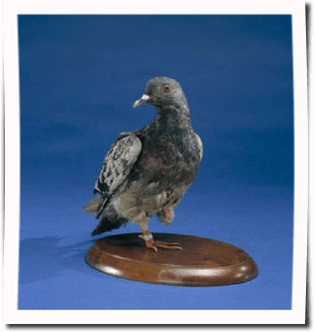Today is National Pigeon Day. It honors Cher Ami, a carrier pigeon that valiantly completed its World War I mission to deliver military intelligence to the U.S. Army in France, even after being shot and suffering a partially severed limb. It succumbed to its injuries several months later on June 13, 1919.
Ami was posthumously awarded the French Croix de Guerre medal for heroism in combat. The U.S. chose to honor the bird by stuffing it and putting it on display in the National Museum of American History in Washington, D.C. (It is no longer on public view but is kept in storage as part of its permanent collection.)

Cher Ami
With Cher Ami’s sacrifice in mind, New York Bird Club founder Anna Dove (née Augusta Kugelmas) created National Pigeon Day in 2008. In an interview, she told the New York Times, “We are trying to do for pigeons what Martin Luther King did for his people.”
Dove submitted the first celebration to the Kids’ Activities section of New York Magazine:
“We’re trying to promote a positive image. There’s such negativity for no reason. They’re harmless, defenseless. They can’t attack; their beak is very soft.”
“Kids will learn cool pigeon facts…as they nibble on pigeon-shape cookies, view pigeon-inspired children’s art, and take part in a candlelight prayer service.” (Dove worries there might not even be urban pigeons in five years.)
We’re sure Miss Dove is gratified to know that her efforts have successfully averted pigeon extinction. We’re a bit concerned about awakening our children’s carnivorous instincts by feeding them sugar-laden representations of the birds we mean to save. We certainly hope they’re gluten-free to promote, you know, freedom.
Meanwhile, [Dove] urges all New York families to “carry a bit of bread crumbs in your bag, a few seeds to show kindness and respect. The pigeon isn’t a threat or an enemy. It goes along with quality of life to show kindness and compassion to all living things.” That’s a lovely lesson for the children.
Yes, littering is a great lesson. Here’s a better one. Give a cookie to a homeless person and let him drop the crumbs that will feed our feathered friends and that other European import, the Norway rat.
Like pigeons, rats fastidiously clean themselves and only become vermin-infested disease vectors because of their squalid living conditions. But will rats ever get their own holiday? No, and not just because they aren’t cute enough, but because it’s a stupid idea.

The second annual National Pigeon Day, on June 13, 2009, attracted authors, performers, and activists. Charles Patterson read from his book, Eternal Treblinka: Our Treatment of Animals and the Holocaust. Amos Latteier, whose public art projects have included a telephone-operated karaoke protest song, a 500-pound potato battery, and a chainsaw-powered walking machine, delivered a PowerPoint lecture about his construction of a pigeon condo.
Ted Enik and Enid Crow performed a humorous puppet play about the downfall of an arrogant politician determined to rid his city of pigeons to impress his seven-year-old ornithophobic daughter. The Vivian Girls, best known for college-radio hit “Kitten Lemonade Stand,” performed “Pigeons on Parade” and “Pigeon Goes to a Party” to a rapt audience.
The parks department agreed to let the club host its gathering without a permit, but stressed that the feeding of the wild birds or animals was illegal. That led to this awkward statement on the National Pigeon Day blog:
Samples of high-quality bird feed and grit will be given out courtesy of Gail at The Pigeon Store; however, please respect Central Park rules and regulations: Feeding of birds and other wildlife prohibited, and please do not litter.
Dove had tangled with the city before. In 2003, she was arrested for assault after throwing birdseed in the face of a Parks Department volunteer, Carol McCabe, who told her city rules prohibit feeding in public parks. McCabe’s eye was scratched, requiring medical attention. She obtained a restraining order, worried that Dove was “a little kooky.”
According to Andrew Blechman, author of Pigeons: The Fascinating Saga of the World’s Most Revered and Reviled Creature, Dove (then Kuglemas) said the volunteer was “a bitch with Mafioso ties” and that she’d thrown the seed at the woman to protect herself. McCabe later dropped the charges, and Dove founded the New York Bird Club to fight institutional pigeon prejudice, which eventually led to National Pigeon Day.
The third annual National Pigeon Day celebration clashed with the Puerto Rican Day parade, also scheduled on June 13, 2010. Lack of a permit meant that the pigeons’ special day had to be moved to June 19. Racial bias? Perhaps. Dove petitioned the government to ratify June 13 as National Pigeon Day. To date, her effort has proven unsuccessful.
Dove had been a victim of prejudice a few months before, in February 2010, when enraged retired schoolteacher Arthur Schwartz snatched a bag of birdseed from her hands and threw it over a fence. He initially fled the scene but later explained he’d become upset that rats were being fed as well.

Anna Dove
She filed charges against Schwartz, who she said poked and shoved her, telling the New York Post, “The guy was violent, I wouldn’t be surprised if he had a weapon next time.” Six years later, we see no evidence that he served any time for the assault.
Dove had high hopes that Woody Allen would finally attend National Pigeon Day and apologize for referring to pigeons as “rats with wings.” Since 2008, she had circulated a message urging members of her New York Bird Club and other bird lovers to pressure him to show up. Here is an excerpt of that directive:
For nearly 30 years this “racial slur” has and is presently being perpetuated by the media who use it to ridicule and degrade pigeons so that they have no respect in our society and, therefore, are treated with contempt and hatred by the general public.
Despite publishing contact information for his agent, manager, and publicist, none of her followers were able to coerce Mr. Allen into making an appearance.
He’s hardly the only pigeon hater to attract negative attention. In 2007, after Brooklyn Councilman Simcha Felder proposed fining pigeon feeders $1,000, Council Speaker Christine Quinn said she had “no love” for “flying rats.” (She also said she wouldn’t allow her personal feelings to interfere with her professional judgment, which sounds pretty reasonable to us.)
Urban Wildlife Coalition founder Johana Clearfield wrote Quinn, slamming her as “clueless,” since “pigeons have nothing in common with rats, and calling her comment an “epithet . . . much like the n-word.”
Felder claimed the feeding ban was aimed at minimizing pigeon excrement, which damages city infrastructure with its ammonia and uric acid. Each pigeon drops an average of 25 pounds of poop per year. That’s a lot of crap. But bird boosters weren’t buying his story. They held a rally at City Hall against the proposed ban, carrying signs that said things like, “Have you known anybody killed by a pigeon?”

No, we’ve never known someone killed by a pigeon. (But we also don’t know anyone killed by a feral cockroach. That’s just one more creature too ugly to get its own day.) Demonstrators argued that pigeons teach children an appreciation for living things. Don’t the millions of people in New York City count as living things?
And when City Council member James Oddo suggested birth control, approved by PETA and the Humane Society, to combat corrosion, clean up the Staten Island Ferry terminal and keep maggot-ridden poop from raining down from the ceiling panels, the pigeon groupies came down on him like, well, poop from a ceiling. Joanna Tierno, the moderator of a pigeon Internet site, told a reporter:
It’s just a horrible idea just to kill off all these innocent animals, and for what reason? You can’t help but remember the Holocaust. Jews were killed because people didn’t want to look at them anymore.
Innolytics, the medication’s manufacturer, received an award in 2010 from the U.S. Humane Society for its work to reduce animal suffering and advance animal welfare. The ASPCA and PETA also support humane alternatives to lethal bird control.
In the past several years, the Pigeon Day blog has fallen silent, and New York Bird Club’s website has disappeared. An International Pigeon Day Facebook event lasted only one year; Timeout London’s 2012 listing of National Pigeon Appreciation Day turned out to be a hoax asking pub crawlers to share their beers with pigeons, but only if they were Stella Artois or better.
Anna Dove’s trail has run cold except for allegations made in 2013 that she used aliases including Cher Ami to set up Facebook, Twitter and Blogspot accounts as “The Yogi Whisperer” to impersonate Dechen Karl Thurman, Uma Thurman’s brother, and “harass people in his professional and personal life.” The post asked victims to come forward so that evidence could be consolidated against the “mentally disturbed individual.”
While pigeons deserve fair treatment, activists who equate the birds’ suffering to that of Jews during the Holocaust, compare their description as “flying rats” to the n-word, and describe themselves as freedom fighters on par with a leader assassinated for his efforts to attain racial equality, are, to put it mildly, delusional.
We’re going to give PETA, unlikely voice of reason, the last word:
There are people who buy heavy bags of bird seed and walk around New York City, London, and other cities dropping huge piles of it on to public sidewalks and in parks. Naturally, pigeons flock there to eat, and then breed. These people think they are helping, but in reality, they are doing more harm than good….
Have you ever considered asking your local park or city to put up signs discouraging the feeding of pigeons? Have you supported or opposed a local ordinance that would establish mandatory guidelines for feral cat colony management? Can we—who care about and advocate for animals—stop letting irrational impulses dictate our actions toward them?
We couldn’t have said it better ourselves.
To gain another perspective, read this hilarious 2010 interview of some feisty New York pigeons eager to share their opinions and drop some truth on a few heads in Central Park and on the steps of City Hall.

 The short answer is that it’s probably nonsense verse made popular (no pun intended) because children enjoyed shouting, “Pop!” It’s believed to have originated in the 1700s in England, but the first official version of the song wasn’t published there until the 1850s. Within a few years, it jumped the pond and appeared in Boston and New York newspapers.
The short answer is that it’s probably nonsense verse made popular (no pun intended) because children enjoyed shouting, “Pop!” It’s believed to have originated in the 1700s in England, but the first official version of the song wasn’t published there until the 1850s. Within a few years, it jumped the pond and appeared in Boston and New York newspapers.




 June 13, 2025: National Blame Someone Else Day is celebrated on the first Friday the 13th of each year. It varies widely, occurring in February 2026, August 2027, October 2028, and so on. According to almost every source we checked, the holiday was invented by Anne Moeller of Clio, Michigan, in 1982.
June 13, 2025: National Blame Someone Else Day is celebrated on the first Friday the 13th of each year. It varies widely, occurring in February 2026, August 2027, October 2028, and so on. According to almost every source we checked, the holiday was invented by Anne Moeller of Clio, Michigan, in 1982.

